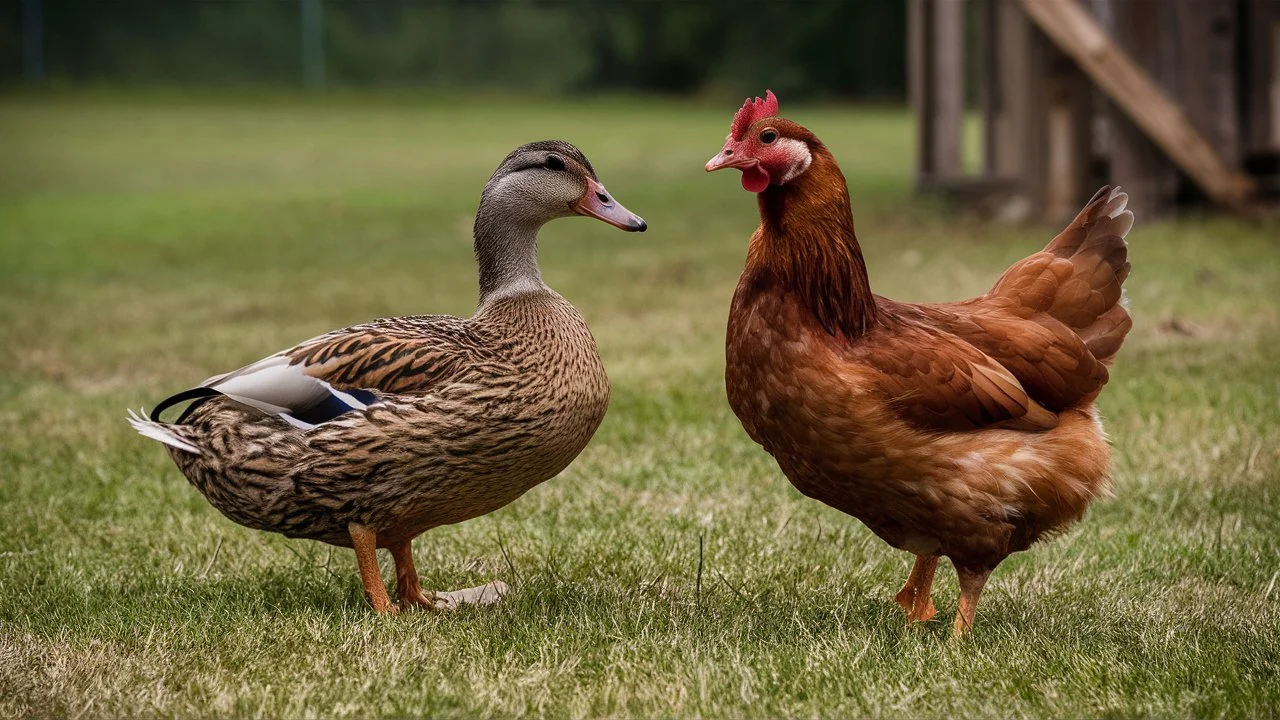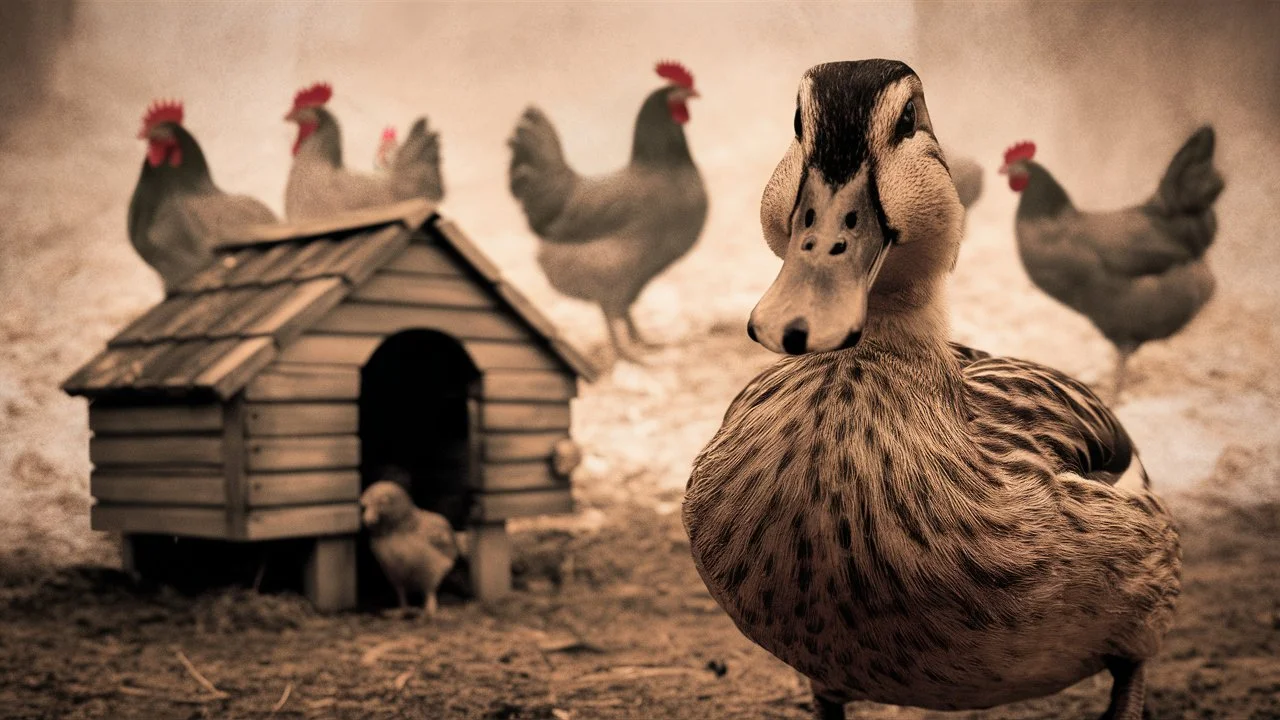Have you ever wondered if ducks can hurt or kill chickens? Many people who keep both ducks and chickens together worry about this. Ducks and chickens can sometimes live happily in the same space, but there are a few things to consider. Ducks are usually gentle birds, but they can act differently depending on their mood, the space they have, and the time of year.
It’s important to understand their behavior to make sure both your ducks and chickens stay safe and healthy. This article will help you learn more about how ducks and chickens can get along and what to watch out for.
No, ducks usually do not kill chickens. Ducks are generally gentle birds and can live peacefully with chickens. However, sometimes they might chase or peck at chickens, especially if there is not enough space or food. It’s important to give them enough room and watch their behavior to make sure both ducks and chickens are safe and happy.
Will Ducks Kill Chickens?
Many people who keep ducks and chickens together wonder if ducks can hurt or even kill chickens. Here, we will provide a detailed answer to this question in simple words and offer practical tips on how to ensure ducks and chickens live together safely.
Ducks and Chickens Can Live Together
In general, ducks do not kill chickens. Ducks are usually gentle birds and can coexist peacefully with chickens. However, there are instances when ducks might chase or peck at chickens, but these behaviors are typically not severe enough to cause serious harm.

Why Ducks Might Chase Chickens
There are several reasons why ducks might chase or peck at chickens:
- Lack of Space: Ducks and chickens need enough space to move around freely. If they are kept in a crowded area, they may become stressed and more likely to show aggressive behavior.
- Competition for Resources: If there is not enough food or water for both ducks and chickens, they might compete for these resources. This competition can lead to chasing or pecking.
- Breeding Season: During breeding season, ducks, especially male ducks (drakes), can become more territorial and aggressive. This increased aggression can sometimes be directed towards chickens.
- Personality Differences: Just like people, some ducks and chickens have different personalities. Some ducks may naturally be more dominant or aggressive, which can lead to conflicts.
Related reading: Do Ducks Fly at Night?
How to Keep Ducks and Chickens Safe
To ensure that your ducks and chickens live together peacefully, follow these guidelines:
- Provide Plenty of Space: Make sure that your ducks and chickens have enough room to move around. A spacious living area can reduce stress and decrease the likelihood of aggressive behavior.
- Ensure Sufficient Resources: Provide ample food and water for both ducks and chickens. Having enough resources can prevent competition and reduce conflicts.
- Separate During Breeding Season: If you notice increased aggression during the breeding season, consider separating the ducks and chickens temporarily until the breeding season is over.
- Monitor Behavior: Keep an eye on the behavior of your ducks and chickens. If you notice any aggressive behavior, take steps to address it immediately, such as providing more space or separating aggressive individuals.
- Create Separate Sleeping Areas: Ducks and chickens have different sleeping habits. Ducks like to sleep on the ground, while chickens prefer to roost. Providing separate sleeping areas can help reduce conflicts.
Will Ducks Kill Baby Chickens?
Many people who keep ducks and chickens together worry about the safety of baby chickens. Here, we will answer this question in simple words and provide tips to ensure the safety of baby chickens around ducks.
Ducks and Baby Chickens
Generally, ducks do not kill baby chickens on purpose. However, ducks are larger and stronger than baby chickens and can unintentionally harm them. This can happen if ducks peck at or step on baby chickens.
Reasons for Concern
There are several reasons why you should be cautious when keeping ducks and baby chickens together:
- Size Difference: Ducks are much larger than baby chickens. Even a gentle peck or accidental step can seriously harm a baby chicken.
- Aggressive Behavior: While ducks are usually gentle, they can sometimes display aggressive behavior, especially if they feel threatened or if there is competition for resources.
- Resource Competition: If there is not enough food or water, ducks might become aggressive in their efforts to access these resources, potentially harming baby chickens in the process.
- Protective Mothers: Mother hens are very protective of their chicks. If a duck gets too close, the hen might become aggressive, leading to conflicts that could harm the baby chickens.
How to Keep Baby Chickens Safe
To ensure the safety of baby chickens around ducks, follow these guidelines:
- Separate Living Spaces: Keep baby chickens in a separate, secure area away from ducks. This will prevent accidental harm and allow baby chickens to grow safely.
- Supervise Interactions: If you allow ducks and baby chickens to interact, always supervise them closely. This way, you can quickly intervene if any aggressive behavior occurs.
- Provide Ample Resources: Ensure there is enough food and water for both ducks and baby chickens to prevent competition and aggression.
- Monitor Behavior: Keep a close eye on the behavior of both ducks and baby chickens. If you notice any signs of aggression or stress, separate them immediately.
- Gradual Introduction: If you plan to introduce baby chickens to ducks, do it gradually and under supervision to ensure they adapt well to each other.
Will Ducks Kill Chickens During the Day?
Many people who keep both ducks and chickens together worry about potential conflicts. Here, we will answer whether ducks can kill chickens during the day in simple and easy-to-read words.

Daytime Behavior of Ducks and Chickens
Ducks and chickens can usually live together peacefully during the day. However, there are a few reasons why ducks might chase or peck at chickens:
- Territorial Behavior: Ducks might become territorial, especially if they feel their space is being invaded.
- Resource Competition: If there is not enough food or water, ducks and chickens might compete, leading to conflicts.
- Personality Differences: Just like people, some ducks and chickens have different personalities. Some ducks may naturally be more dominant or aggressive.
How to Prevent Conflicts
To keep both your ducks and chickens safe and happy during the day, follow these tips:
- Provide Enough Space: Make sure there is plenty of room for both ducks and chickens to move around freely.
- Ensure Sufficient Food and Water: Provide ample resources to prevent competition and reduce the chance of conflicts.
- Monitor Their Behavior: Keep an eye on your ducks and chickens. If you notice any aggressive behavior, take steps to address it immediately.
- Separate If Needed: If conflicts arise, consider separating aggressive individuals or providing different areas for ducks and chickens during the day.
Will Male Ducks Try to Mate with Chickens?
Yes, male ducks (drakes) might try to mate with chickens, and this behavior can be problematic for several reasons. Here, we will explain this issue in simple words and provide tips on how to handle it.
Why Male Ducks Might Try to Mate with Chickens
- Confusion: Drakes might confuse chickens with female ducks, especially if they are kept together without enough female ducks.
- Aggressive Mating Behavior: Drakes can be quite aggressive when they try to mate, which can be harmful to chickens.
Risks of Mating Attempts
- Injury to Chickens: Drakes are larger and stronger than chickens. Their mating behavior can cause serious injuries to chickens, such as broken bones or internal damage.
- Stress for Chickens: Being chased and mounted by drakes can be very stressful for chickens, affecting their overall health and well-being.
How to Prevent Mating Attempts
To ensure the safety and well-being of your chickens, follow these guidelines:
- Separate Housing: Keep drakes and chickens in separate areas, especially during mating season.
- Provide Enough Female Ducks: Ensure there are enough female ducks for the drakes. This can reduce the likelihood of drakes trying to mate with chickens.
- Monitor Behavior: Keep an eye on your flock. If you notice a drake trying to mate with a chicken, separate them immediately.
- Use Barriers: If separation is not possible, use barriers to keep drakes and chickens apart while allowing them to see each other, reducing stress and aggression.
Can Ducks Get Sick from Chickens?
Yes, ducks can get sick from chickens. Both ducks and chickens can share diseases and parasites, so it’s important to take precautions to keep both species healthy. Here, we will explain the risks and provide tips on how to prevent the spread of illnesses between ducks and chickens.
Common Diseases and Parasites
- Avian Influenza: Both ducks and chickens can carry and transmit avian influenza, which can cause severe illness in both species.
- Salmonella: This bacterial infection can affect both ducks and chickens, leading to diarrhea and other health issues.
- Newcastle Disease: This viral disease can be transmitted between ducks and chickens, causing respiratory and neurological symptoms.
- Parasites: External parasites like mites and lice, and internal parasites like worms, can easily spread between ducks and chickens.
How Diseases Spread
- Direct Contact: Diseases can spread through direct contact between ducks and chickens.
- Shared Resources: Shared food, water, and living spaces can facilitate the spread of diseases and parasites.
- Contaminated Equipment: Using the same equipment for both ducks and chickens without proper cleaning can transfer pathogens.
Prevention Tips
To keep your ducks and chickens healthy, follow these guidelines:
- Separate Living Areas: If possible, keep ducks and chickens in separate living areas to reduce the risk of disease transmission.
- Clean and Disinfect: Regularly clean and disinfect coops, feeders, waterers, and other equipment to minimize the spread of pathogens.
- Provide Clean Water: Ensure both ducks and chickens have access to clean, fresh water. Change water regularly to prevent contamination.
- Monitor Health: Regularly check both ducks and chickens for signs of illness, such as lethargy, changes in appetite, or abnormal droppings. Isolate any sick birds immediately.
- Vaccination: Consult with a veterinarian about appropriate vaccinations for both ducks and chickens to protect them from common diseases.
- Parasite Control: Implement a regular parasite control program, including treatments for mites, lice, and worms.
Conclusion
ducks usually do not kill chickens. While ducks and chickens can live together peacefully, there are times when ducks might chase or peck at chickens. This usually happens because of lack of space, competition for food, or personality differences. By providing enough space, food, and water, and by watching their behavior, you can help ducks and chickens live happily together. If you notice any problems, separating them might be the best solution to keep both your ducks and chickens safe and healthy.

